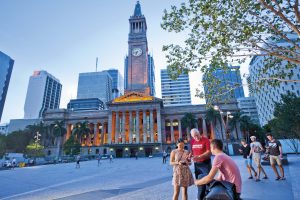Brisbane’s journey to become a water-wise city
Water defines Brisbane as a river city. It provides a sense of place through thousands of kilometres of waterways and sustains our population, biodiversity and natural areas. Water powers Australia’s New World City, which is home to more than one million people and is one of the fastest growing regions in Australia.
The significant floods that hit Brisbane in 2011 and 2013 and the Millennium Drought (1995 – 2009) have reshaped our city’s relationship with water, highlighting the importance of managing water at all stages of the water cycle. To ensure Brisbane meets the challenges of an increasing population, and to respond to our changing climate, Brisbane City Council has developed strategies around water conservation, recycling and reuse, along with an integrated approach to mitigating flood risks to enhance city resilience.
WaterSmart and FloodSmart Future strategies and, in partnership with Queensland Urban Utilities, a Total Water Cycle Management Plan are the core of our response to the challenges we face today and in the future.
As the Lord Mayor, one of my top priorities is to keep Brisbane the cleanest and greenest city in Australia. Our WaterSmart Strategy focuses on protecting our waterways, maintaining sustainable water resources and systems, designing infrastructure with water and flood risk in mind and ensuring our community plays a role in managing water sustainably. With community education strategies, Brisbane has become a city of water savers. During the millennium drought, Brisbane residents reduced their water consumption from 300 to 127 litres per day.
The recently released Brisbane 2022 New World City Action Plan highlights a multi-faceted approach requiring both city-wide and region-wide collaboration to achieve a number of economic priorities. To support Brisbane’s economic priorities, Brisbane City Council works regionally to improve the resilience of our waterways to provide clean drinking water, healthy productive farming lands and fisheries and tourism assets such as the iconic Ramsar site, Moreton Bay.
As Brisbane is located on a floodplain, we’ve learned to live with flooding and adopted the FloodSmart Future strategy, which recognises flooding is a highly likely event for which we can plan and design mitigation strategies. This policy response includes new interactive Flood Awareness Maps to enhance citizens’ flood awareness and preparedness should another flood hit Brisbane again.
It is for these reasons Brisbane City Council is embracing the International Water Association’s Principles for Water Wise Cities. These provide a framework to assist urban leaders and professionals to develop and implement their vision for sustainable urban water and resilient planning and design in their cities. The ultimate goal being to encourage collaborative action, underpinned by a shared vision, so that local governments, urban professionals and individuals actively engage in addressing and finding solutions on urban water management challenges.
As the Lord Mayor of Brisbane, I am privileged to host the City Leaders Forum to be held during the World Water Congress and Exhibition, 09 – 14 October in Brisbane. The City Leaders Forum (11 – 12 October) will bring together water leaders and experts from across the world to learn from and connect with fellow professionals. I invite you to attend, to share your stories and to learn more about IWA’s Principles for Water Wise Cities.
We need your involvement and collective efforts in creating more resilient and water wise cities. I look forward to welcoming you to Brisbane and to participating with you in this inspiring forum.
Read more about Brisbane’s journey to become a water-wise city here.
More information about Brisbane can be found here:
https://www.brisbane.qld.gov.au/environment-waste/water/watersmart-strategy
https://www.brisbane.qld.gov.au/environment-waste/water/brisbanes-total-water-cycle-management-plan
http://www.choosebrisbane.com.au/2022plan?sc_lang=en-au


